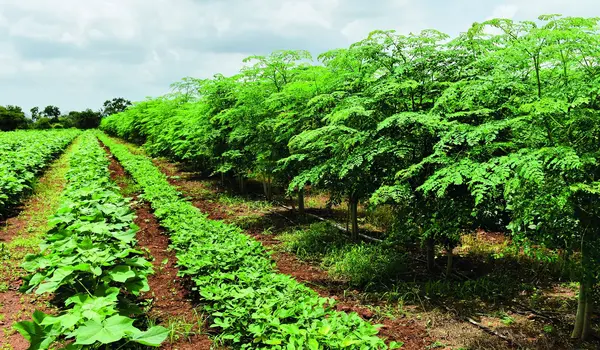Crop diversification is a cornerstone of sustainable agriculture, offering numerous advantages that enhance farm productivity, soil health, and environmental resilience. By growing a variety of crops, farmers can optimize their agricultural systems, reduce risks, and contribute to ecological balance. This blog explores the multiple benefits of crop diversification and how it supports sustainable farming practices. Crop diversification involves growing different types of crops within a single farming system or across various fields. It contrasts with monoculture, where a single crop is cultivated extensively over large areas. Diversification can be achieved through various methods, such as intercropping, rotation, and mixed cropping. 1. Enhancing Soil Health Crop diversification plays a significant role in improving soil health, which is vital for sustainable agriculture: Nutrient Management: Different crops have varying nutrient requirements and uptake patterns. By rotating crops or planting diverse species together, farmers can reduce nutrient depletion and enhance soil fertility. For instance, legumes can fix atmospheric nitrogen, enriching the soil for subsequent crops. Organic Matter: Growing diverse crops adds organic matter to the soil through varied root systems and plant residues. This improves soil structure, water-holding capacity, and microbial activity. Pest and Disease Management: Diverse cropping systems can disrupt the life cycles of pests and diseases, reducing their prevalence. Certain crops can act as trap crops or attract beneficial insects that help control pest populations. 2. Reducing Risk and Enhancing Resilience Diversification helps mitigate risks and enhances farm resilience to various challenges: Weather Variability: Diverse crops can better withstand extreme weather conditions. If one crop fails due to drought or flooding, others may still thrive, providing a buffer against total loss. Market Fluctuations: Growing a variety of crops allows farmers to adapt to market demands and price fluctuations. This diversification reduces reliance on a single crop, spreading economic risks. Pest and Disease Outbreaks: By reducing monoculture, farmers can lower the risk of widespread pest and disease outbreaks, as diverse crops are less likely to be uniformly affected by specific pathogens. 3. Promoting Biodiversity Crop diversification contributes to greater biodiversity within agricultural systems: Habitat Creation: A variety of crops provides diverse habitats for beneficial insects, birds, and other wildlife. This promotes ecosystem balance and enhances natural pest control. Pollinator Support: Diverse flowering crops attract and support pollinators such as bees and butterflies. This is crucial for the pollination of many crops and wild plants. Soil Microbial Diversity: Different crops support a range of soil microorganisms, which contribute to soil health and nutrient cycling. 4. Improving Farm Productivity Diversifying crops can lead to more efficient use of resources and improved overall productivity: Resource Utilization: Different crops use water, nutrients, and sunlight in varying ways. By diversifying, farmers can maximize resource use and reduce waste. For example, deep-rooted plants can access nutrients and moisture that shallow-rooted crops cannot. Continuous Harvest: Growing a variety of crops can provide a steady supply of produce throughout the growing season, enhancing farm profitability and reducing market saturation. 5. Supporting Sustainable Practices Crop diversification aligns with the principles of sustainable agriculture: Reduced Chemical Use: Diverse cropping systems often require fewer synthetic inputs such as fertilizers and pesticides. Natural pest control and nutrient management are more effective in diversified systems. Soil Conservation: Crop rotation and intercropping help prevent soil erosion and degradation. Cover crops and green manures protect the soil and enhance its structure. Climate Adaptation: Diversified cropping systems are more adaptable to changing climate conditions. By growing a mix of crops, farmers can better manage the impacts of climate variability. Humic Factory offers a range of products that enhance the benefits of crop diversification: Organic Amendments: Humic Factory’s organic compost and soil conditioners improve soil fertility and structure, supporting healthy growth for a variety of crops. Humic Acids: These products boost nutrient uptake and soil health, which is particularly beneficial in diversified cropping systems where nutrient needs vary. Biofertilizers: Humic Factory’s biofertilizers support soil microbial diversity and improve plant health, enhancing the effectiveness of diversified cropping systems. Soil Conditioners: Products designed to improve soil moisture retention and aeration help maintain optimal conditions for diverse crops. By integrating Humic Factory’s products into a diversified cropping system, farmers can maximize the benefits of their agricultural practices and achieve sustainable, productive, and resilient farming systems. Crop diversification is a powerful strategy for achieving sustainability in agriculture. By enhancing soil health, reducing risks, promoting biodiversity, and improving productivity, diversified cropping systems contribute to a more resilient and efficient farming approach. Humic Factory’s products play a crucial role in supporting these benefits by improving soil fertility and plant health. Embracing crop diversification and utilizing effective agricultural solutions can help farmers build more sustainable and successful farming operations. Through thoughtful integration of diverse crops and innovative products, farmers can navigate the challenges of modern agriculture while promoting environmental stewardship and long-term productivity.Understanding Crop Diversification
How Humic Factory’s Products Support Crop Diversification
Conclusion


Submit your contact number to receive exclusive updates
Something went Wrong Please try again!!!
Bulk Purchase
Get Bulk Discount
Get Discount Code now
फोन नंबर सबमिट करे और ऑफर पाए
We believe farming is hard. This is our attempt to support farmers. Submit your contact details to receive a discount and other offers from Humic Factory.

Recommended Products
COPYRIGHT © 2024. All Rights Reserved By Humic Factory


